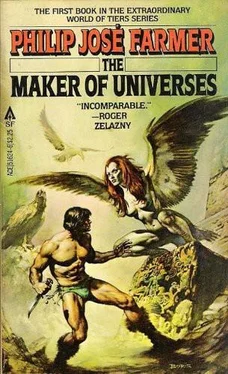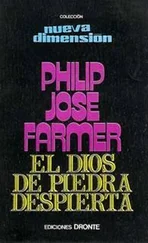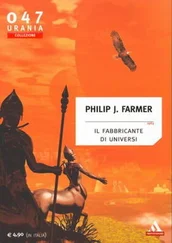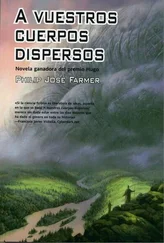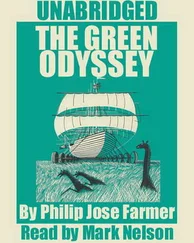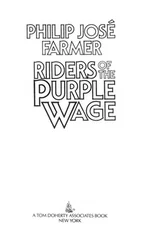Podarge said, “I do not know what this is all about, and I feel that I am somehow being betrayed. But I will do as you say, Kickaha, for I know of you and know that you are a bitter enemy of the Lord. But do not try my patience too far.”
Then Kickaha whispered an even stranger thing to Wolff. “Now I recognize Abiru. The beard and the stain on his skin fooled me, plus not having heard his voice for twenty years.”
Wolff’s heart beat fast with an undefined apprehension. He took his scimitar and conducted Abiru, whose hands were bound behind him, into a small room. And here he listened.
An hour later, he returned to the others. He looked stunned.
“Abiru will go with us,” he said. “He could be very valuable. We need every hand we can get and every man with knowledge.”
“Would you care to explain that?” Podarge said. She was narrow-eyed, the mask of madness forming over her face.
“No, I will not and cannot,” he replied. “But I feel more strongly than ever that we have a good chance for victory. Now, Podarge how strong are your eagles? Have they flown so far tonight that we must wait until tomorrow night for them to rest?”
Podarge answered that they were ready for the task ahead of them. She wanted to delay no longer.
Wolff gave his orders, which were relayed by Kickaha to the apes, since they obeyed only him. They carried out the large crossbars and the ropes to the outside, and the others followed them.
In the bright light of the moon, they lifted the thin but strong cross-bars. The human beings and the fifty apes then fitted themselves into the weblike cradles beneath the crossbars and tied straps to secure themselves. Eagles gripped the ropes attached to each of the four ends of the bars and another gripped the rope tied to the center of the cross. Wolff gave the signal. Though there had been no chance to train, each bird jumped simultaneously into the air, flapped her wings, and slowly rose upward. The ropes were paid out to over fifty feet to give the eagles a chance to gain altitude before the cross-bars and the human attached to each had to be lifted.
Wolff felt a sudden jerk, and he uncoiled his bent legs to give an extra push upward. The bar tilted to one side, almost swinging him over against one of the bars. Podarge, flying over the others, gave an order. The eagles pulled up more rope or released more length to adjust for balance. In a few seconds, the cross-bars were at the correct level.
On Earth this plan would not have been workable. A bird the size of the eagle probably could not have gotten into the air without launching herself from a high cliff. Even then, her flight would have been very slow, maybe too slow to keep from stalling or sinking back to Earth. However, the Lord had given the eagles muscles with strength to match their weight.
They rose up and up. The pale sides of the monolith, a mile away, glimmered in the moonlight. Wolff clutched the straps of his cradle and looked at the others. Chryseis and Kickaha waved back. Abiru was motionless. The shattered and prone wreck of Rhadamanthus’ tower became smaller. No ravens flew by to be startled and to wing upward to warn the Lord. Those eagles not serving as carriers spread wide to forestall such a possibility. The air was filled with an armada; the beat of their wings drummed loudly in Wolff’s ears, so loudly that he could not imagine the noise not traveling for miles.
The time came when this side of ravaged Atlantis was spread out in the moonlight for him to scan in one sweep of the eye. Then the rim appeared, and part of the tier below it. Dracheland became visible as a great half-disc of darkness. The hours crept by. The mass of Amerindia appeared, grew and was suddenly chopped off at the rim. The garden of Okeanos, so far below Amerindia and so narrow, could not be seen.
Both the moon and the sun were visible now because of the comparative slenderness of this monolith. Nevertheless, the eagles and their burdens were still in darkness, in the shadow of Idaquizzoorhruz. It would not last for long. Soon this side would be under the full glare of the daytime luninary. Any ravens would be able to see them from miles away. The party had, however, drifted close to the monolith, so that anyone on top would have to be on the edge to detect them.
At last, after over four hours, just as the sun touched them, they were level with the top. Beside them was the garden of the Lord, a place of flaming beauty. Beyond rose the towers and minarets and flying buttresses and spiderweb architectures of the palace of the Lord. It soared up for two hundred feet and covered, according to Kickaha, more than three hundred acres.
They did not have time to appreciate its wonder, for the ravens in the garden were screaming. Already the hundreds of Podarge’s pets had swooped down upon them and were killing them. Others were winging toward the many windows to enter and seek out the Lord.
Wolff saw a number get inside before the traps of the Lord could be activated. Shortly thereafter, those attempting to climb in through the openings disappeared in a clap of thunder and a flash of lighting. Charred to the bone, they fell off the ledges and onto the ground below or on the rooftops or buttresses.
The human beings and the apes settled to the ground just outside a diamond-shaped door of rose stone set with rubies. The eagles released the ropes and gathered by Podarge to wait for her orders.
Wolff untied the ropes from the metal rings on the cross-bars. Then he lifted the bars above his head. After running to a point just a few feet from the diamond-shaped doorway, he cast the steel cross into it. One bar went through the entrance; the two at right angles to it jammed against the sides of the door.
Flame exploded again and again. Thunder deafened him. Tongues of searing voltage leaped out at him. Suddenly, smoke poured from within the palace, and the lightning ceased. The ravaging device had either burned out from the load or was temporarily discharged.
Wolff took one glance around him. Other entrances were also spurting blasts of flame or else their defenses had burned out. Eagles had taken many of the cross-bars and were dropping them at an angle into the windows above. He leaped over the whitehot liquid of his cross-bar and through the door. Chryseis and Kickaha joined him from another entrance. Behind Kickaha came the horde of giant apes. Each carried a sword or battle-axe in his hand.
Kickaha asked, “Is it coming back to you?”
Wolff nodded. “Not all, but enough, I hope. Where’s Abiru?”
“Podarge and a couple of the apes are keeping an eye on him. He could try something for his own purposes.”
Wolff in the lead, they walked down a hall the walls of which were painted with murals that would have delighted and awed the most critical of Terrestrials. At the far end was a low gate of delicate and intricate tracery and of a shimmering bluish metal. They proceeded toward it but stopped as a raven, fleeing for its life, sped over them. Behind it came an eagle.
The raven passed over the gate, and as it did so it flew headlong into an invisible screen. Abruptly, the raven was a scatter of thin slices of flesh, bones and feathers. The pursuing eagle screamed as it saw this and tried to check her flight, but too late. She too was cut into strips.
Wolff pulled the left section of the gate toward him instead of pushing in on it as he would naturally have done. He said, “It should be okay now. But I’m glad the raven triggered the screen first. I hadn’t remembered it.”
Still, he stuck his sword forward to test, then it came back to him that only living matter activated the trap. There was nothing to do but to trust that he could remember correctly. He walked forward without feeling anything but the air, and the others followed.
Читать дальше
